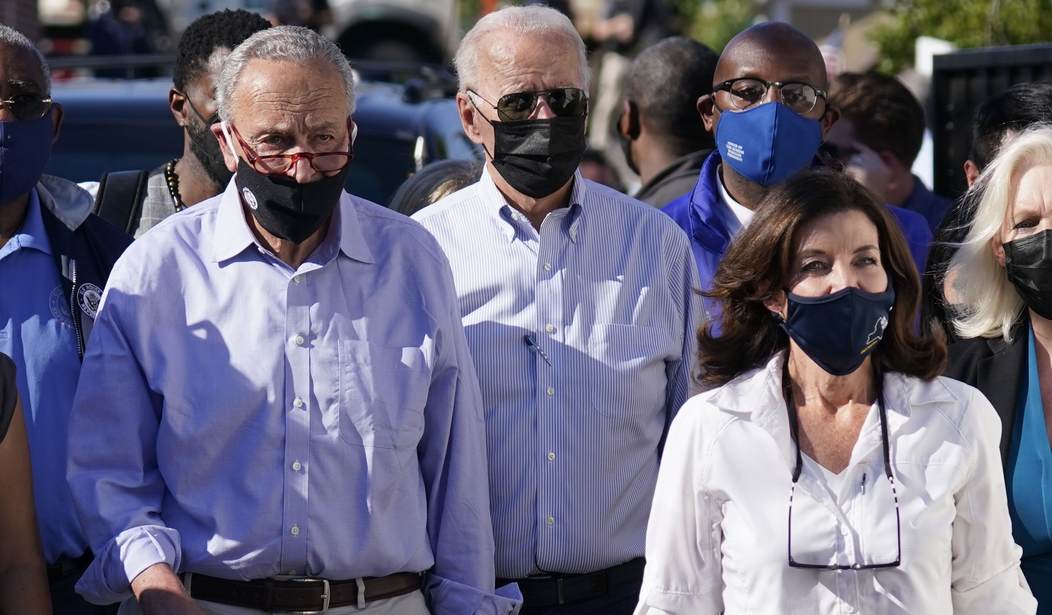It’s still going to be a while before we find out the full extent of all of the poison pills that are buried in the recently passed $1.5 trillion infrastructure bill. It’s not as if any of the people who voted for it actually read the entire thing, but it’s going to take time to sort through a monstrosity of that size. One thing is assured, however. Any time you pile up that much taxpayer money and begin sloshing it around all over the country, people will show up to try to grab a piece of it, even if they have to do so under completely immoral or even illegal methods. That’s the general gist of one analysis published this week at Government Executive. The infrastructure bill is going to present seemingly endless opportunities for the unscrupulous to cash in and there are few provisions built into the bill to prevent that from happening.
Lawmakers passed the US$1.2 trillion bipartisan infrastructure bill on Nov. 5, 2021, with negotiations still ongoing over Democrats’ $1.75 trillion plan to expand the social safety net and tackle climate change.
The proposed $3 trillion in total spending is not only a big investment but a serious target for fraud.
Most government spending does reach the intended targets – like mass transit, clean energy and broadband internet – but some of the money will undoubtedly be lost to fraud. How much is impossible to predict, but I believe a reasonable estimate based on past spending and research would put it at around 5%, or $150 billion. That’s equivalent to the gross domestic product of Ukraine.
The analyst who arrived at these figures, Jetson Leder-Luis, highlights a variety of ways that aspiring fraudsters typically fleece the taxpayers, concluding that $150 billion or more will end up going to people who should not be getting that money. One of the more common methods he highlights involves the inevitable awarding of a huge number of lucrative contracts to private companies. Far too many of these deals wind up being given out on either a no-bid basis or with very few bidders being approved. That allows the contractors to vastly inflate their estimates and overcharge for both materials and labor. The infrastructure bill offers no serious provisions with any teeth in them to ride herd over the process.
He also talks about a common phenomenon known as “information asymmetry.” That’s a fancy way of saying that private sector contractors almost always know a lot more about the details of the work they are doing for the government than anyone in the government actually does. And when they know what the government doesn’t know, the door is open to heavily inflate their prices, realizing that nobody in the government will ask any questions. They just sign the checks.
The two new bills that are currently on the way also include even more programs to supposedly assist companies and individuals that were negatively impacted by the pandemic and the ensuing economic crash. These are being constructed in a similar fashion to the Paycheck Protection Program found in the original COVID relief bill. As we’ve discussed here before, a staggering number of those PPP loans were awarded to companies that didn’t even exist except on paper. One clever California man cashed in on more than $5 million in PPP money, supposedly to keep his struggling (but nonexistent) employees on the payroll. He used the money to buy a massive collection of vintage automobiles until his lavish excesses finally led to him being exposed.
Jetson Leder-Luis estimates that 15% of all of the PPP loans that were approved are suspected of being fraudulent. That adds up to more than $76 billion in fraudulently wasted taxpayer dollars. And this new infrastructure bill does not include any new fraud prevention programs to stop this from happening.
The government does have fraud prevention programs in place. The False Claims Act allows people aware of government fraud to retain attorneys and go to court to recover the money for the federal government, a portion of which they are allowed to keep as a reward. Unfortunately, these programs are very much underutilized. That’s probably because the only people who know for sure that these types of fraud are taking place are the ones who are profiting from it, so they are unlikely to turn themselves in.
So what’s to be done about it now? Sadly, probably not much. The bill is already written so the horses are nearly out of the barn at this point. But keep your eyes on this topic over the next couple of years. It’s a safe bet that a huge chunk of that infrastructure bill will disappear down a rathole and very few of the people doing the stealing will be held accountable.







Join the conversation as a VIP Member